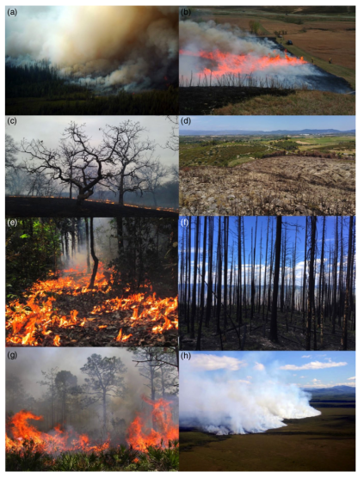The Science
The Future of Fire Consortium (FFC), composed of ecologists from around the globe with expertise ranging from paleoecology to atmospheric science, identified critical research frontiers in six areas of fire ecology and three emergent themes for future fire ecology research including: (1) the need to study fire across temporal and spatial scales, (2) the need to assess the mechanisms underlying a variety of feedbacks in the fire system, and (3) the need to improve representation of fire in a range of modeling contexts.
The Impact
As fire regimes and our relationships with fire continue to change, prioritizing these research areas and emergent themes will facilitate understanding of the ecological causes and consequences of future fires and fire management.
Summary
In this review, critical research frontiers in six areas of fire ecology were identified: (1) expanding concepts of fire regimes, (2) understanding changing fire regimes, (3, 4) examining fire effects on aboveground and belowground ecology, (5) increasing fuels characterization in determining fire behavior, and (6) improving representation of fire processes in a variety of modeling contexts. Within these areas, three emergent themes for future fire ecology research including: (1) the need to study fire across temporal and spatial scales, (2) the need to assess the mechanisms underlying a variety of feedbacks in the fire system, and (3) the need to improve representation of fire in a range of modeling contexts. This review offers guidance to further our effort to understand both the fundamental role of fire in ecological systems and the human role in shaping fire activity. As fire regimes and our relationships with fire continue to change, prioritizing these research areas and emergent themes will facilitate understanding of the ecological causes and consequences of future fires and fire management.

Contacts (BER PM): Daniel Stover, SC-23.1, Daniel.Stover@science.doe.gov (301-903-0289)
PI Contact: Kendra McLauchlan, Kansas State University, mclauch@ksu.edu
Funding
This manuscript is a product of discussions at the Future of Fire workshop held in November 2017 in Boulder, Colorado, USA. Support for this workshop was provided by NSF‐DEB‐1743681 to K.K.McLauchlan and A.J.Tepley. J.K. Shuman was supported by Next-Generation Ecosystem Experiments (NGEE Tropics), a project supported by the Office of Biological and Environmental Research in the Department of Energy, Office of Science.
Publications
McLauchlan, K. K., P. E. Higuera, J. Miesel, B. M. Rogers, J. Schweitzer, J. K. Shuman, A. Tepley, J. M. Varner, T. T. Veblen, et al., 2020, “Fire as a fundamental ecological process: research advances and frontiers.” Journal of Ecology 00:1-23 doi: 10.1111/1365-2745.13403
Related Links
Article URL: https://besjournals.onlinelibrary.wiley.com/doi/full/10.1111/1365-2745.13403